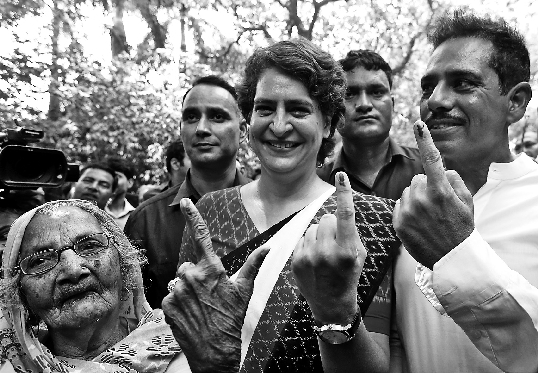
VOTERS in northern India lined up early yesterday to cast their ballots in the second-to-last round of a seven-phase general election, with Prime Minister Narendra Modi facing a diverse group of opposition parties seeking to deny him a second term. More than 100 million people across seven states are eligible to vote in the sixth phase of the 39-day-long poll, which Modi began on April 11 as front-runner after an escalation of tension with neighboring Pakistan. But opposition parties have recently taken heart at what they see as signs Modi’s Hindu nationalist Bharatiya Janata Party (BJP) may be losing ground and have begun negotiations over a post-election alliance even before polling ends May 19. Votes will be counted May 23. The president of the main opposition Congress party, Rahul Gandhi, said the main issues in the election were unemployment, distress in the countryside, the demonetization of bank notes and a new sales tax. “It was a good fight,” Gandhi said after he cast his vote. “Narendra Modi used hatred, we used love. And I think love is going to win.” A lack of new jobs — despite annual economic growth of about 7 percent — and the plight of farmers struggling with falling crop prices have been major worries for voters. A new good and services tax (GST), as well as Modi’s shock ban on all high-value currency notes in 2016, hurt small and medium businesses. Some voters in the capital, New Delhi, said they were backing Modi because they were won over by his tough stand on security. Indian warplanes attacked what the government said was a terrorist training camp in Pakistan in February, soon after a suicide car bomb attack in the disputed Kashmir region killed 40 police officers. The aggressive response stirred nationalist passions that pollsters said could favor Modi in the election. “I have voted for Modi’s sound foreign policy and national security,” said a 36-year-old first-time voter who declined to be identified. “The demonetization has affected jobs growth but over time, the positive effects of GST and demonetization would take care of jobs,” he said. But concern about unemployment and crop prices have put the BJP on the back foot, and the opposition has in recent days felt more upbeat about its chances. Political analysts say state-based and caste-driven parties could be decisive in determining the make-up of the next government. “Regional parties will play a bigger role compared to the previous five years or even 15 years,” said K.C. Suri, a political science professor at the University of Hyderabad. “They will regain their importance in national politics.” Recent weeks have also been marked by personal attacks between leaders, including comments from Modi about the family of Congress President Rahul Gandhi, the scion of the Nehru-Gandhi political dynasty. (SD-Agencies) | 
